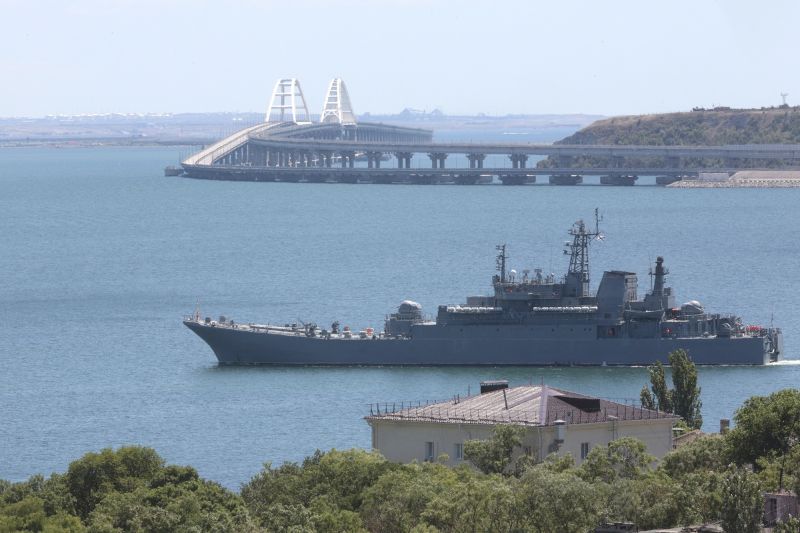
Russian tour operators beg Crimea vacationers not to cancel trips following bridge attack
Russian tour operators are pleading with vacationers to Crimea not to make decisions “based on emotions,” as Ukraine’s strike on the Crimea bridge on Monday played havoc on travel between the occupied Ukrainian peninsula and Russia.
Hundreds of cars were waiting Tuesday to cross the bridge both to and from Crimea, and Russian-backed officials were encouraging drivers to travel along the land route through occupied southern Ukraine.
“We have cancellations for the end of July and August,” Elena Bazhenova, head of the Laspi Crimean tour company said, according to the Russian Union of Tourist Industry. “We are explaining to tourists that cancellations for these dates are only possible with penalties.”
“We [are trying to] convince tourists not to make decisions based on emotions,” Bazhenova said. “We expect the situation to normalize in the coming days.”
Crimea, which was illegally annexed by Russia from Ukraine in 2014, is a popular Russian destination for summer vacations. But a Ukrainian attack on Monday destroyed a large section of the Crimea bridge’s road span – which connects Kerch in Crimea to Russia’s Krasnodar region – upending the main route for car traffic to the peninsula.
Evgenia Kizey, sales director for Multitour, said tourists were having different reactions but there was “no panic.”
“People will leave as exit routes are opened by train or car,” Kizey said, according to The Russian Union of Tourist Industry. “For those who arrive by car in Crimea in the near future, we offered to rebook tours to our hotels in the Krasnodar Territory. Tourists also willingly choose the Moscow region and other regions. Or we shift their reservations in Crimea to later dates.”
Road traffic over the Crimea bridge resumed overnight over one of the bridge’s four lanes, but there is heavy traffic. Public traffic mapping tools show that there are significant delays for cars both entering and leaving Crimea, and Russia state media distributed video of long lines of cars.
As of late morning on Tuesday, there were around 700 cars waiting to cross the strait into Crimea and 500 cars waiting to cross the bridge into Russia’s Krasnodar region, according to a Telegram account devoted to facilitating Crimean travel.
Rail traffic continues to operate over the bridge, albeit with delays.
Russia-backed leaders in occupied southern Ukraine are encouraging drivers to use the land route through the occupied portions of Ukraine’s Donetsk, Zaporizhzhia and Kherson regions. That route passes through Mariupol, which was devastated last year by Russia’s invasion, and Melitopol, which as a Russian military hub is regularly subject to long-range Ukrainian missile strikes.
Curfews have been lifted on the road to and from Crimea, the leaders in those regions said Monday, to allow for “round-the-clock” travel.
“A number of measures are being introduced to ensure the faster passage of checkpoints on the administrative border,” Denis Pushilin, head of the separatist so-called Donetsk People’s Republic, said on Telegram.
Russian state media RIA Novosti reported Tuesday morning that the line of cars waiting to enter Crimea at Chonhar, in Ukraine’s Kherson region, stretched for more than 1.5 kilometers (just under a mile).
TASS reported that bus services from Rostov, in southern Russia, to Crimea had been restored – via southern Ukraine, rather than over the Crimea bridge.
A tourist from the Russian city of Rostov told the Russian tourism website Tourdom about her experience driving to Crimea.
“We left Rostov yesterday at 11 a.m., around 7 p.m. we were at the Chongar checkpoint,” she said, using the Russian spelling for that town. She said that they waited for several hours at the checkpoint and they were sent to the back of the queue after – in the chaos – she tried to jump the line.
“I was very tired,” she said. “It’s good that after Chonhar my husband drove. Because of this delay, we arrived in Alushta only at one o’clock in the morning.”
Hotels in Crimea are helping tourists stranded by the lack of travel options by extending their stays, sometimes free of charge, the head of the Russian Union of Travel Industry said.
“We call on all members of the Crimean hotel industry to behave responsibly in this difficult situation, so that people understand that they will not be left alone with their problems,” Ilya Umansky, said in a statement.
